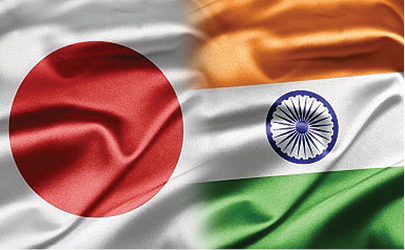
Articles
India and Japan; A Strategic Partnership for the Indo-Pacific Era
Sub Title : Japan’s investments in India are increasing as the two nations emerge as strong friends and partners
Issues Details : Vol 18 Issue 6 Jan – Feb 2025
Author : Ambassador Gurjit Singh
Page No. : 32
Category : Geostrategy
: January 25, 2025

India and Japan share a long-standing relationship rooted in mutual trust, shared democratic values, and a vision for a free and open Indo-Pacific. Over the years, their strategic partnership has deepened, driven by the rising geopolitical challenges in the region and their membership in the Quadrilateral Security Dialogue (QUAD). The two nations have increasingly collaborated in defence and space, aiming to bolster regional security and drive technological advancements. Their efforts underscore a commitment to addressing shared concerns, fostering innovation, and ensuring stability in the Indo-Pacific region.
Japanese Interest in the Indian Market
Japanese companies have significantly revised their outlook on India, demonstrating greater enthusiasm for conducting business there. A survey by the Japan External Trade Organization (JETRO) revealed that 80% of respondents expressed interest in expanding operations in India within the next two years, marking a 4.7% increase from the previous year. This shift reflects diminishing confidence in China, where business sentiment among Japanese firms dropped by 21.7%, the lowest level since 2007. Similarly, enthusiasm for Thailand, traditionally a favoured destination, declined by 8.1% due to political instability.
The Japan Bank for International Cooperation (JBIC) also reported an increase in Japanese entrepreneurs viewing India as a promising market, rising to 58% compared to 48% in a previous survey. Conversely, confidence in China as an investment destination dropped to 17%.
India’s robust economic growth, expanding population, and rising middle class have contributed to this shift. Sustained economic progress has led to higher profits and greater satisfaction among Japanese businesses operating in India, further solidifying India’s position as an attractive investment destination.
Military Cooperation
In August 2024, India and Japan held their third ‘2+2’ Foreign and Defence Ministerial Meeting in New Delhi. This high-level dialogue emphasized defence cooperation as a cornerstone of their Special Strategic and Global Partnership. The discussions reaffirmed both nations’ commitment to enhancing bilateral defence collaboration, particularly in technology transfer and the co-development of military hardware. A notable outcome was the discussion on Japan’s UNICORN mast technology, which enhances the stealth capabilities of Indian Navy warships. This marked a significant milestone, as it was the first instance of military technology developed by Japan’s private sector being shared with India. Such cooperation reflects the trust and strategic alignment between the two countries. India also encourages Japanese companies to participate as key players in its emerging defence corridors.
To improve interoperability and readiness, India and Japan have conducted several joint military exercises. In 2023, the tri-service drills demonstrated their commitment to comprehensive defence cooperation. The inaugural ‘Veer Guardian 2023’ air exercise at Japan’s Hyakuri Air Base brought together the Indian Air Force and the Japan Air Self-Defense Force. Additionally, the ‘Dharma Guardian 2024’ exercise emphasized tactical coordination and mutual understanding between their armies, further strengthening the defence partnership.
India’s Geospatial Market
The increasing collaboration in space was evident during GeoSmart India 2024, held in Hyderabad. The event included the third India-Japan Space and Geospatial Business Summit. Recognizing India’s geospatial market’s potential—valued at approximately `30,000 crores and growing at 12% annually—Japanese participants expressed strong interest in strategic partnerships, innovation, and knowledge sharing. Experts project that collaborations in this domain could expand India-Japan geospatial trade to $10 billion by 2030, further strengthening economic ties.
India’s space agency ISRO and Japan’s JAXA are collaborating on Earth observation, lunar exploration, and satellite navigation. Their partnership includes monitoring rice crop areas and air quality using satellite data. Additionally, the National Institute of Advanced Studies in India and the University of Tokyo are jointly studying space policies in the Asia-Pacific region.
Japan’s FDI in India’s Defence Industry
Japan’s increasing Foreign Direct Investment (FDI) in India’s defence sector highlights the growing bilateral partnership. Key factors driving this investment include:
Strategic Alignment: Shared security concerns in the Indo-Pacific region necessitate closer defence collaboration.
Economic Opportunities: India’s growing defence market and ‘Make in India’ initiative offer lucrative opportunities for Japanese companies.
Policy Reforms: India’s liberalized FDI policies in defence have made it more attractive for foreign investors.
Japanese investments focus on advanced technology transfers, joint ventures, and co-production of defence equipment. These efforts aim to strengthen India’s defence manufacturing capabilities while providing Japanese companies access to a burgeoning market.
Future Prospects
Enhanced Defence Collaboration. India and Japan are well-positioned to expedite defence technology transfers and co-development projects. The successful transfer of technologies like the UNICORN mast can serve as a model for future collaborations. By leveraging public and private sector partnerships, the two nations can foster a robust ecosystem for defence innovation.
Expanded Joint Exercises. Increasing the frequency and scope of joint military exercises is vital for improving interoperability and readiness. Expanding these drills to include new scenarios and multi-domain operations will better prepare both nations for evolving security challenges. Furthermore, trilateral and multilateral exercises involving other QUAD members can enhance collective security in the Indo-Pacific.
Space Technology Innovation. The space domain offers immense potential for collaboration. India and Japan can deepen their partnership in satellite technology, space exploration, and space situational awareness. Initiatives like the Orbital Lasers-InspeCity collaboration exemplify their leadership in sustainable space operations and technological innovation.
Economic and Technological Partnerships. Beyond defence and space, India and Japan can explore joint ventures in emerging technologies such as artificial intelligence, cybersecurity, and quantum computing. These partnerships will drive economic growth and enhance technological resilience.
In Conclusion. The deepening collaboration between India and Japan in defence and space reflects their shared commitment to addressing common challenges and fostering mutual growth. As trusted partners in the Indo-Pacific, India and Japan’s strategic partnership holds the promise of greater stability and prosperity for the region and beyond.


